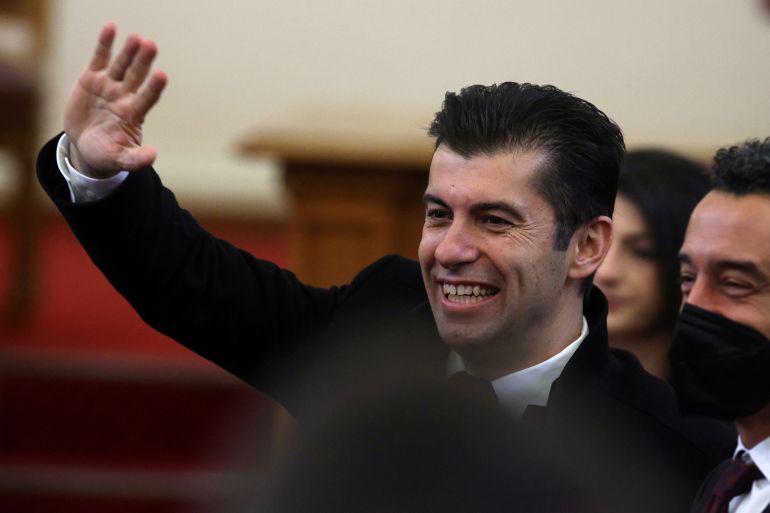Bulgaria: Centrist PP party seals coalition deal to form gov’t
Bulgaria’s parliament expected to vote on a new government after eight months of political deadlock.

Bulgaria’s new centrist We Continue The Change (PP) party says it has sealed a broad coalition deal with socialist, populist and centre-right factions after eight months of political paralysis.
The agreement announced on Friday, which will put a regular government with a four-year term in place after two interim administrations this year, raises the prospects of a revival of anti-corruption reforms.
Keep reading
list of 3 itemsNew anti-corruption party leading Bulgaria’s parliamentary vote
Bulgarians vote in elections for third time this year
Former centre-right premier Boyko Borissov’s decade-long rule ended in April after an election that showed popular anger over high-level corruption in the European Union’s poorest member state.
PP, which won Bulgaria’s third parliamentary election this year on November 14, teamed up with Borissov’s political rivals – the left-wing Socialists, populist ITN party and centre-right Democratic Bulgaria to agree on a ruling majority coalition.
PP leader Kiril Petkov, nominated as Bulgaria’s next prime minister, is expected to present his nominations for ministers to President Rumen Radev on Saturday and face a vote in parliament as early as Monday, a party official said.
The new coalition is expected to have a majority of 134 lawmakers in the 240-seat parliament.
“The agreement is 140 pages and details all policies. It gives the chance for the coalition to be strong and work for a long time,” Petkov told the national BNR radio after the party signed the document with each of its partners separately.
Petkov, a 41-year-old entrepreneur, gained popularity for his drive to uncover wrongdoings in state institutions under Borissov during a four-month stint as interim economy minister. Borissov has denied any wrongdoing.
Despite the unlikely alliances that make up the coalition, Assen Vassilev, who leads the PP party along with Petkov, was upbeat.
“It feels good, because the bulk of the tough decisions were cleared beforehand … This is not a natural coalition. We had to go through three elections to reach this point,” said Vassilev, who is nominated to be finance minister.
Anti-corruption drive
Under the coalition deal, the partners agreed to revamp the country’s anti-corruption agency and carry out legal changes to make the country’s chief prosecutor more accountable.
New Bulgarian University political science professor Antony Todorov told the AFP news agency that the negotiations were a process where “ideological differences gave way before a common objective – to oust [Borissov’s] GERB from power”.
Another analyst, Gallup’s Andrey Raychev told the AFP he saw the coalition as “a culmination of the revolt” of thousands of Bulgarians who joined massive anti-corruption protests in 2020, seeking to remove Borisov and put an end to corruption.
Corruption has long been the dominant political topic in Bulgaria. Voters have pinned their hopes on successive leaders pledging to clean up public life, only to see administrations crashing in scandals.
“Bulgarians understand that time is needed to restart growth and boost incomes. But they would not forgive a lack of will to fight corruption,” political analyst Kantcho Stoychev told the Reuters news agency.
The new government will also need to move rapidly to seek to shield the economy from the pandemic and high energy prices, and also to try to boost the coronavirus vaccination rate.
Less than 30 percent of adults are fully inoculated in the country of seven million people.